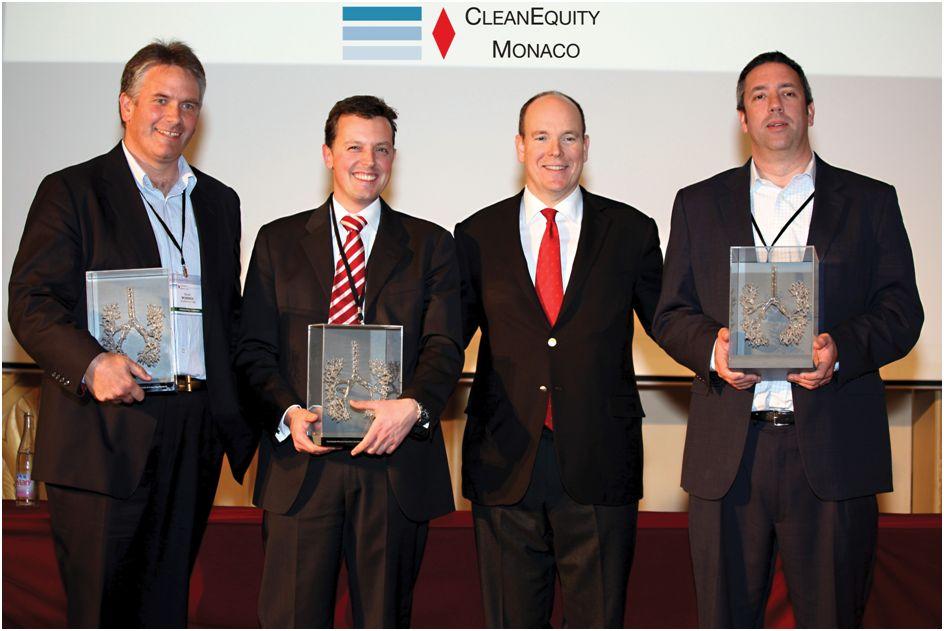ArcActive, a spinout company from the University of Canterbury, is developing new negative electrodes for lead acid batteries for start/stop and micro hybrid vehicles. The technology was unveiled at the CleanEquity 2012 conference in Monaco where the company won the award for Excellence in the Field of Environmental Technology Research. Stuart McKenzie, Chief Executive of ArcActive says, “The auto industry is undergoing a quiet revolution towards green cars. Conventional lead-acid batteries can’t cope with the cycle demands for micro-hybrids and would only last a matter of weeks. So the race is on to develop new battery technology for these cars. Our technology has world beating performance and is very low cost, so we hope it wins out over other new technologies.”
Recently mandated emission targets in both the EU and USA are driving the market penetration of these vehicles as automakers focus on fuel economy. ArcActive batteries have a high dynamic charge acceptance and battery recharge rate which is required to improve performance in micro-hybrids with regenerative breaking. The market for start/stop batteries has been forecast to grow from 5 million batteries per year in 2011 to 39 million per year (US$6.3B) by 2017 and nearly 100 million per year by 2020. It is expected that start/stop cars using ArcActive lead acid batteries will have a longer life and consume 10 percent less fuel, compared to 2-4 percent if using alternate technology AGM batteries, at no extra cost. Mr McKenzie says ArcActive are hoping to be an important component of this emerging multibillion dollar market for new battery technology for micro hybrids and start/stop vehicles. “We’ve tested the performance of our batteries using new protocols developed by the hybrid car industry and obtained exciting results. We’re now working on scaling up the technology and replicating these results with international car and battery manufacturers.”
ArcActive electrodes are developed from a novel processing technology for carbon materials developed by Dr John Abrahamson, Associate Professor, Department of Chemical and Process Engineering at the University of Canterbury. The continuous system for the production of carbon nanotubes (CNT's) and activated carbon allows carbon nanotubes to be deposited on conducting substrates. The resulting highly transformed carbon fabric can be used in electrodes for batteries and super capacitors. Other applications include cathodes for backlights and lamps, cathodes for CNT TV, gas ionisation sensors and X-ray tubes. Dr Abrahamson says ArcActive’s process enables carbon nanotube based devices that were previously seen as being not commercially viable to now be made. ArcActive has patent protected a variety of technology applications.
The University of Canterbury project received early support via a $225,000 KiwiNet PreSeed investment from Ministry of Science and Innovation to prove the technology. McKenzie says that this early support was critical in getting the project to this stage as early work identified electrodes for batteries as a key application for the technology. He says, “It’s been a very collaborative effort getting to this point. We’ve received some great support from KiwiNet in terms of funding and expertise from other members. This support allowed us to move the project to a point where we could attract additional technology grants from the Ministry of Science and Innovation and private investor funds to get to where we are today.”
Ministry of Science and Innovation chief executive Murray Bain says the award is deserved recognition of ArcActive’s dedication to innovation. “Kiwis are great at coming up with good ideas, but it’s sometimes a challenge to turn those ideas into something valuable. ArcActive are showing the way – not only developing new technology, but doing so in such a way that industry wants to be a part of it.” ArcActive is currently working to build partnerships with companies that can help with the product development and manufacture.

ArcActive unveils new battery technology for green car market
Thursday, 12 April 2012


